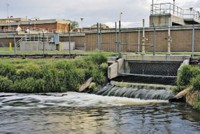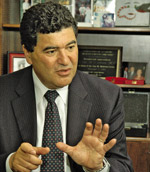Advertisement
Grab your lab coat. Let's get started
Welcome!
Welcome!
Create an account below to get 6 C&EN articles per month, receive newsletters and more - all free.
It seems this is your first time logging in online. Please enter the following information to continue.
As an ACS member you automatically get access to this site. All we need is few more details to create your reading experience.
Not you? Sign in with a different account.
Not you? Sign in with a different account.
ERROR 1
ERROR 1
ERROR 2
ERROR 2
ERROR 2
ERROR 2
ERROR 2
Password and Confirm password must match.
If you have an ACS member number, please enter it here so we can link this account to your membership. (optional)
ERROR 2
ACS values your privacy. By submitting your information, you are gaining access to C&EN and subscribing to our weekly newsletter. We use the information you provide to make your reading experience better, and we will never sell your data to third party members.
Policy
First Ban on Rail Shipments Passed
Washington, D.C., passes measure to block hazardous cargo near the Capitol
by Jeff Johnson
February 7, 2005
| A version of this story appeared in
Volume 83, Issue 6
TRANSPORTATION SECURITY
The Council of the District of Columbia, by a 10-to-1 vote last week, banned hazardous material shipments within a 2.2-mile radius of the U.S. Capitol, in effect blocking hazardous rail shipments through the city. It is the first U.S. jurisdiction to pass such restrictions.Y
Because of congressional oversight of D.C. governance, Congress may choose to overturn the bill. But the measure sets a precedent that could have reverberations nationwide as communities struggle to deal with the vulnerability implicit from rail shipment of hazardous materials through cities and towns.Y
The D.C. bill bans shipments of large quantities of explosives, flammable gases, and poisonous gases and materials. If no practical alternative route exists, the D.C. government may issue permits and specify safety measures, including time-of-day restrictions.Y
Washington, D.C., Mayor Anthony A. Williams has said he will sign the bill. It was passed as emergency legislation, giving it a 90-day life, but a permanent bill has been introduced.Y
City officials in Washington have been debating rail security legislation for more than a year, noting that hazardous materials move by rail within blocks of the Capitol building, possibly the nation's prime terrorist target. Pressure for passage increased, however, because of heightened community interest and publicity surrounding recent rail accidents in Pennsylvania, Los Angeles, and South Carolina. Nine people died in the South Carolina accident (C&EN, Jan. 17, page 11).Y
Council member Kathleen Patterson, who led the push for a ban, said federal studies show that 100,000 people could be killed or injured from an attack on a rail tanker near the Capitol resulting in the release of hazardous materials. The federal government, she added, has not acted to prevent such a terrorist attack, and Department of Homeland Security (DHS) officials have said they would not mandate rerouting of railcars that carry hazardous materials.Y
Carol Schwartz, the council member who cast the lone vote against the bill, contended that private conversations among city officials, representatives of DHS, and CSX Corp., which owns the rails, reveal that rerouting is already taking place. The bill "would undo the good that already has been done," she said.Y
Council members who voted for the bill countered that a voluntary program based on verbal assurances was unenforceable and inadequate.Y
The bill is opposed by CSX, DHS, and chemical companies. The Association of American Railroads says the measure merely shifts risk to other communities while increasing handling and the distance that materials travel. American Chemistry Council officials put forth similar arguments, adding that the materials in question are critical to U.S. chemical production.Y
But interest in rail security is growing, and other cities are considering similar bills, notes Fred Millar, a security consultant to unions and community groups. He says officials from Cleveland, Los Angeles, Philadelphia, and St. Louis—which are among 50 cities identified by DHS as high security risks from a terrorist attack-have contacted him. Similarly, on Jan. 18, some 50 mayors wrote to the Department of Transportation and DHS urging that the agencies warn cities whenever hazardous materials pass through their jurisdictions.Y
In Congress, House and Senate members have promised new security legislation for hazardous material transport as well as new rail safety bills. But many in Congress say they oppose such bills.





Join the conversation
Contact the reporter
Submit a Letter to the Editor for publication
Engage with us on Twitter